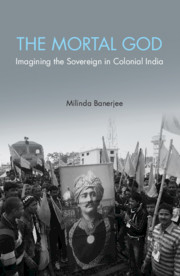Book contents
- Frontmatter
- Dedication
- Contents
- Acknowledgements
- Note on Transliteration
- Abbreviations
- Note on Documents Used
- Introduction
- 1 ‘Caesar of India’: Debating the British Monarchy and Colonial Rulership
- 2 ‘State is the Household Vastly Enlarged’: Imagining Sovereignty through the Princely States
- 3 ‘One Law, One Nation, One Throne’: Debating National Unity
- 4 ‘One has to Rule Oneself’: Collectivising Sovereignty in Peasant Politics
- 5 ‘God's Kingdom Has Come’: Messianic Sovereignty in Late Colonial India
- Conclusions and Further Thoughts
- Index
4 - ‘One has to Rule Oneself’: Collectivising Sovereignty in Peasant Politics
Published online by Cambridge University Press: 13 September 2018
- Frontmatter
- Dedication
- Contents
- Acknowledgements
- Note on Transliteration
- Abbreviations
- Note on Documents Used
- Introduction
- 1 ‘Caesar of India’: Debating the British Monarchy and Colonial Rulership
- 2 ‘State is the Household Vastly Enlarged’: Imagining Sovereignty through the Princely States
- 3 ‘One Law, One Nation, One Throne’: Debating National Unity
- 4 ‘One has to Rule Oneself’: Collectivising Sovereignty in Peasant Politics
- 5 ‘God's Kingdom Has Come’: Messianic Sovereignty in Late Colonial India
- Conclusions and Further Thoughts
- Index
Summary
Introduction
This chapter focuses on ‘peasant’ (including ‘tribal’) communities in twentieth-century India. They occupied ambiguous and shifting positions in ‘caste’ (varna-jati) hierarchies, and one of the ways in which their politics can be conceptualised is through the prism of ‘caste’ politics. I focus particularly on those peasant groups which claimed a ‘royal’ origin, describing themselves as belonging to the Kshatriya varna and as descendants and kinsmen of Kshatriya rulers. These assertions bolstered their claim to rule themselves, implying both mastery over their individual selves and a collectivised claim to social-political authority. Sometimes they asserted a divine identity and ancestry by deploying a Kshatriya theology. I argue that these peasant communities contributed significantly towards collectivising and democratising notions of rulership, divinity and sovereignty in twentieth-century India. They did this by flexibly combining precolonial South Asian ideas about collective rulership and godhood with Western-origin democratic and socialist ideas. Precolonial-origin community structures were linked by peasant politicians with Western-modern institutional forms to produce hybridised associations. Given that these peasant discourses were generally carried out in regional Indian languages and not in English, and in locally-circulated journals and pamphlets that seldom reached metropolitan elite audiences (and have often become difficult to locate today except in select and scattered public and private archives), the historiographic amnesia from which these discourses have suffered needs urgent remedy.
As mentioned in the beginning of this book, these peasant actors created such notions of collectivised rulership to demand from the state reservations in political representation, education and employment. They regarded such measures as absolutely indispensable in combating the asymmetries of economic, social, ritual and political power which subalternised them vis-à-vis high-caste Indians. Across the early-mid twentieth century, the British as well as some Indian princes, in order to attract the political loyalty of these communities (in an era of rising anti-colonial nationalism), began to gradually respond to some of their demands about reservation and welfare. Simultaneously, these peasant groups organized initiatives to spread modern education, to foster agricultural, industrial and financial development, and to improve healthcare facilities for their members. The claim to regality thus encompassed a wide range of grassroots measures to ‘subalternise capital’ and ‘vernacularise progress’.
- Type
- Chapter
- Information
- The Mortal GodImagining the Sovereign in Colonial India, pp. 289 - 349Publisher: Cambridge University PressPrint publication year: 2017



